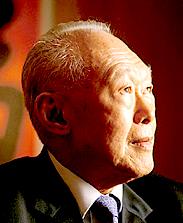
What makes a statesman? Is it signing lots of treaties? Is it preventing wars? Is it winning wars? Is it founding great governmental institutions? Is it propagating noble ideas about nationhood? Is it founding a nation? What makes a statesman?
A statesman is one who builds an order, whether it is a national order or an international order. A statesman must have an overall vision for what he wants to do, and must have the savvy to know how to put that vision into effect. A statesman must contribute something lasting to his country and to the world.
Who are examples of statesmen? And why are they statesmen? In the next few posts, I will look at various men throughout history whom I think qualify as statesmen, and examine why they qualify as such. Some are famous, some are not--but each of them had those ineffable qualities of vision and ability.
Lee Kwan Yew
Pictured above, this man is known as the "Kissinger of Asia." His main accomplishment is making the tiny island-state of Singapore into a major world economic power. When he started his rule at the time of Singapore's independence in 1959, Singapore was a poor and defenceless backwater; when he ended in 1990, Singapore was an island of wealth and stability amidst the general poverty of Southeast Asia.
One thing that characterized Lee Kwan Yew was his vision: the government of Singapore knew what it wanted to do, created a blueprint for growth and development, stuck to it, and then after completing it moving on to other things. The government under Lee was (as it remains) extraordinarily competent.
So the primary reason why Lee Kwan Yew is a statesman is because he built a nation-state almost single-handedly into a prosperous and responsible member of the world community. But there are other things about Lee that make him a statesman; his foreign policy efforts, especially after his stepping down from the premiership, are widely respected. As well, he is tactful and self-controlled; witness his care not to overstep his bounds after he stepped down from power in 1990.
Of course, he is not without flaws. An autocrat, he refused to tolerate much political dissent during his career, and even now regularly sues those who criticize him (A little like the Church of Scientology?). Some of his government's policies are harsh and illiberal (illiberal in the best sense of the phrase; that is, opposed to classical liberalism), such as racial quotas for immigration and the capital punishment for drug trafficking. Still, statesmen have used such methods in the past, and Lee is certainly a realist in most matters--which is also important for statesmen.
All in all, Lee Kwan Yew is a statesman due to his role in building Singapore to where it is today.
A Bit of Latin
Quid facis, Catilina? Quid cogitas? Sentimus magna vitia insidiasque tuas. O tempora! O mores! Senatus haec intellegit, consul videt.
Quid: "what," interrogative pronoun
facis: "do/make," a third conjugation -io verb in the second person singular
Catilina: "Catiline," personal name in the vocative; Catiline was a conspirator against Cicero when he was consul
Quid: "what," interrogative pronoun
cogitas: "think," a first conjugation verb in the second person singular
Sentimus: "sense/perceive," a third conjugation -io verb in the first person plural
magna: "great," adjective
vitia: "sins/faults," second declension neuter noun in the accusative plural
insidiasque: "treacheries [and]," first declension feminine noun in the accusative plural with modifying "-que" added
tuas: "your," possessive pronoun modifying 'insidias'
O Tempora: "O Time," third declension vocative neuter noun
O mores: "O habits/morals/character," third declension masculine vocative plural
Senatus: "Senate," first declension noun in the nominative singular
haec: "this," demonstrative in the masculine nominative
intellegit: "understand," first conjugation verb in the third person singular
consul: "consul," nominative noun; 'consul' describes one of the two executive officers of the Roman Republic
videt: "see," second conjugation verb in the third person singular
What are you doing, Catiline? What are you thinking? We perceive your treacheries and great sins. O Times! O Morals! This Senate understands, this consul sees.
(Marcus Tullius Cicero)

No comments:
Post a Comment